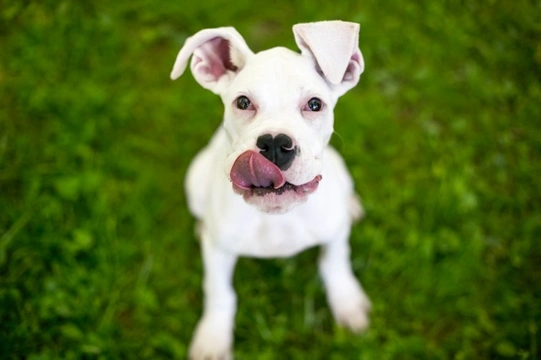
Why are some dogs so obsessive about licking things?
Dogs do a lot of their exploration of the world using their mouths, and their tongues are of course an important part of this! Licking things allows your dog to identify things by taste, enhance scenting, identify texture, and even communicate with others – and dogs can and do lick lots of different things, for lots of different reasons.
Sometimes the meanings behind this are obvious, such as if your dog licks your hand once in greeting, but if your dog is obsessive about licking things, seems to lick a ridiculous range of things, or seems to fixate on certain targets, it is a good idea to consider why this might be.
Whether your dog’s weird licking habits are just a facet of their personality or if they actually indicate that something is amiss, this article will help you to get to the bottom of the matter by explaining some of the most common reasons why some dogs will lick certain things obsessively. Read on to learn more.
Taste and scenting
Dogs will obviously lick things to get a taste for them, like the salt on your skin or a tasty morsel that was dropped on the floor but then cleaned up, but licking can also help dogs to detect scents better as well!
Dogs have a scenting organ called Jacobson’s organ or the vomeronasal organ in the roof of their mouth and palate, which can help to enhance their scenting ability and provide a more 3D picture of something that they have smelled.
Moisture and dehydration
If your dog is desperate for a drink and no water is available, they might lick some very weird things to try to get some moisture – like condensation on a window, a wet floor, or anything else that may be moist or damp. Check immediately that your dog doesn’t need a drink.
Irritations or injuries
If your dog has a cut or graze, or a sensitive or irritating area on their body, they might well lick this to try to negate the pain or irritation, and in some cases, to help to promote healing. This is an ingrained evolutionary behaviour that does serve some purpose, such as removing muck or debris from a wound and cooling the area, but generally it is not advisable to let your dog bother at wounds or injuries in this way, as they will often make them worse rather than better.
However, this can alert you to something being wrong so that you can investigate further.
Self-soothing
If your dog is upset, anxious of frightened, licking themselves can serve as a form of self-soothing. This is much the same as how cats will sometimes purr if in pain or distressed as well as because they are happy, as a way of making themselves feel better.
Dams with pups lick their young too, to clean them up and stimulate their bodily movements, and so a dog licking itself for reassurance can help to mimic this behaviour.
Stress-related obsessive behaviour
Dogs may lick themselves or other things as a type of obsessive behaviour brought on by stress, as repetitive behaviours can divert the mind from the source of upset or unhappiness.
Such behaviour tends to become self-reinforcing and worsen over time, and can even result in the dog licking themselves to the point that they irritate or break the skin, increasing the risk of developing an infection or secondary complication as a result of this.
Digestive problems
If your dog’s digestive system isn’t running as it should of if they’re suffering from a gastrointestinal upset, they might lick things like walls or floors, as this may provide some form of short term or limited relief for reasons that we don’t fully understand.
This is particularly likely to occur if your dog is feeling nauseous, or is suffering from stomach cramps.
Dental problems
Dental discomfort or sore gums will make your dog eat very delicately, and they may well find it hard to eat at all. They will also have pain in and around their mouth, and may feel irritation, discomfort, or pressure too.
Licking surfaces may again make your dog feel better or ease discomfort, for reasons that we don’t fully understand – so have your dog’s teeth checked out by your vet if something seems to be amiss.
Neurological disorders
Finally, if your dog is suffering from neurological problems such as may be caused by dementia in old age, brain injuries, or a range of other conditions that affect the function of the brain and nerves, this can result in misfires of the messages to and from the brain, and the manifestation of a range of unexplained and seemingly nonsensical behaviours.
If your dog licks things and you can’t work out why, if they show any other signs of odd behaviours, or if they are approaching old age and may be entering the final stages of brain decline and the descent into dementia, talk to your vet to find out for sure what is going on, and to get your dog the support they need.



